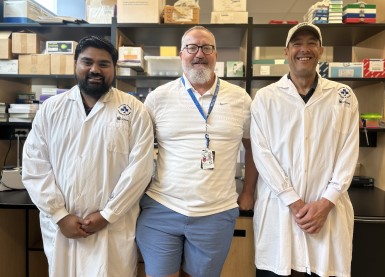 Anupam Sharma, Lynn A Megeney and Steve Brunette For more than 30 years, caspases have been known as tiny cellular executioners, just waiting for a signal to chop up a cell’s proteins and initiate what is known as “programmed cell death.”
Anupam Sharma, Lynn A Megeney and Steve Brunette For more than 30 years, caspases have been known as tiny cellular executioners, just waiting for a signal to chop up a cell’s proteins and initiate what is known as “programmed cell death.”
However, new research from Dr. Lynn Megeney’s team shows that caspases can also help keep cells alive by chopping up or dispersing toxic protein clumps associated with neurodegenerative diseases.
As described in the journal Microbial Cell, Dr. Megeney and his team used a yeast model to show that human caspase 3 can break up toxic clumps of protein associated with amyotrophic lateral sclerosis (ALS). The study also sheds light on the controversial question of why these protein clumps are so toxic, by showing that they interfere with cellular energy factories called mitochondria.
“It is fascinating to see how one protein can kill or protect a cell, depending on the situation,” said Dr. Lynn Megeney, senior scientist at The Ottawa Hospital and professor at the University of Ottawa. “Understanding this could help with the development of new treatment approaches for ALS and other neurodegenerative diseases.”
Authors: Steve Brunette, Anupam Sharma, Ryan Bell, Lawrence Puente, Lynn A Megeney.
Core Resources: Proteomics
Funders: Canadian Institutes of Health Research, Ontario Graduate Student Scholarship award, Queen Elizabeth II Scholarship. All research at The Ottawa Hospital is also enabled by generous donors to The Ottawa Hospital Foundation.
The Ottawa Hospital is a leading academic health, research and learning hospital proudly affiliated with the University of Ottawa and supported by The Ottawa Hospital Foundation.
